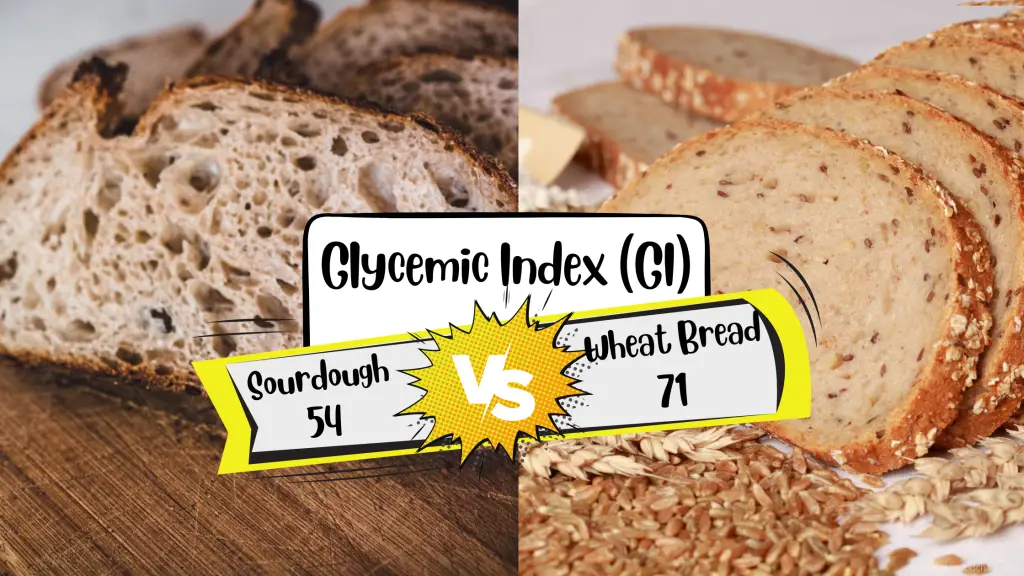Have you ever enjoyed eating soft and springy white bread only to end up bloated?
In pursuit of better alternatives to bloat-causing commercial bread, many people find themselves hooked on the unique crunch and tang of sourdough. As a fermented bread made with ancient techniques, sourdough suddenly made a comeback in the 2000s after being outshined by commercial white bread for several years
With all the love it’s getting, is sourdough bread healthy or it’s just another gimmick of “wellness” companies? In this post, we will discuss the health benefits that made sourdough break into the health and wellness scene and how it can transform our well-being.
Why is it easier to digest sourdough than commercial bread?
The first thing that people notice is the light feeling they experience after munching on a loaf of sourdough. They digest it smoothly and don’t experience bloating due to the altered structure of sourdough through fermentation.
Commercial wheat bread that is often deemed as healthy contains bran which holds phytic acid. When phytic acid is released during digestion, it prevents the digestive enzymes from breaking down the protein and starch from our food. Without the enzymes, the stomach will have a hard time processing the starch which leads to bloating and other digestive problems.

The long fermentation involved in making sourdough alters its structure and makes it easier for the stomach to digest. The good bacteria and wild yeasts in sourdough get rid of the phytic acid in the flour. So, the digestive enzymes are free to break down the bread in your stomach.
According to Berkshire Mountain Bakery founder Richard Bourdon, sourdough also contains acids that trigger your mouth to produce more saliva. Our saliva contains enzymes that begins digestion through the breakdown of starches.
Though sourdough takes longer to rise or ferment, the whole process is all worth the wait because it cuts down substances that cause digestive issues.
6 Reasons why sourdough is healthier than commercial bread
As food journalist Michael Pollan says, sourdough is the proper way to make bread. Its captivating taste, texture, and numerous health benefits below are enough to go back to the ancient way of bread-making in its most organic form.
#1 Sourdough helps you regulate sugar levels and promote weight loss
Though sourdough is still filled with carbohydrates, it has a less sugar content that’s ideal for diabetics and those who are trying to lose weight. The glycemic index of sourdough is around 53 to 54 while whole wheat bread is 71. With a 21-point gap, sourdough is less likely to cause your blood sugar to spike and crash.
The reason behind the reduced sugar in sourdough is the long fermentation process which can reach up to 12 hours. Like kombucha fermentation, sugar in flour is the main food of yeast and bacteria. The longer the dough is exposed to wild yeasts, the more they’ll feed on the sugar available in the dough, leading to its lower glycemic index.

Commercial flour also uses refined flour which contains sugars that rapidly increase blood glucose levels. Sourdough, on the other hand, uses wheat, barley, or rye that is not excessively processed and its sugars are slowly absorbed in the bloodstream due to its increased fiber content.
Sourdough also contains probiotics which help improve gut health, balance good and bad bacteria to reduce inflammation, and increase insulin sensitivity. It is the reason why sourdough is recommended to women suffering from PCOS or Polycystic Ovarian Syndrome, pre-diabetic and diabetics, and the elderly.
#2 Sourdough is an ideal option for gluten-sensitive individuals
Gluten is a protein present in wheat, rye, and barley that binds the bread when the bacteria and yeast release carbon dioxide or bubbles. It has no nutrients and often causes severe symptoms in people with celiac disease, irritable bowel syndrome (IBS), or gluten intolerance.
Commercial bread derived from these materials contains gluten and some suppliers also add additives that further increase the gluten content of the bread. Sourdough also contains gluten but it is significantly decreased during fermentation. The wild yeasts and bacteria help break down the gluten as they consume sugar from the flour.
Due to its less gluten content, patients with digestive problems can consume sourdough without experiencing any side effects or symptoms. The fermentation of sourdough also controls the amount of fructan in the bread which also causes digestive issues in some individuals. However, the non-profit organization Beyond Celiac reiterates that sourdough is not safe for those who have celiac disease.
#3 Sourdough won’t make you fart as much as bread
Grains like oats and wheat contains gas-producing fructans and phytic acid. These substances are the reasons why you often feel gassy after eating commercial bread. They also cause IBS symptoms to worsen and inhibit the body’s ability to absorb vitamins and minerals from the food that you eat.
Through fermentation, these fructans and phytic acid are neutralized and make it easier to digest sourdough and prevent bloating and farting.
#4 Sourdough is a good source of fiber

Sourdough is made of whole wheat flour that has intact vitamins and minerals and is rich in fiber. Fiber helps improve your digestion by bulking up the stool and water, making it easier to pass into your large intestine. It promotes good digestion and prevents constipation. A high-fiber diet also contributes to your overall health through:
- Lower risk of developing hemorrhoids.
- Lowers bad cholesterol or LDL.
- Contributes to a healthy weight.
- Reduced risk for cardiovascular diseases and cancers.
#5 Sourdough boosts better nutrient absorption
Phytic acid is probably the worst content of commercial bread. It’s not only responsible for inhibiting the breakdown of starch and sugar but also for the proper absorption of nutrients and minerals in bread. It binds calcium, magnesium, and iron instead of releasing them to the body for absorption.
Since sourdough is stripping the phytic acid during fermentation, it makes all the nutrients and minerals in the bread bioavailable for the body to absorb. These nutrients and minerals include:
- Folate.
- Niacin.
- Thiamin.
- Riboflavin.
- Selenium.
- Manganese.
#6 Sourdough keeps you feeling full longer
Sourdough is nutritionally dense and contains high amounts of fiber that can help curb your cravings in between meals. The slow release of sugar will not cause your sugar to crash. This means you’ll less likely need to snack as much and you’ll feel more energized. It can also help sustain your energy throughout the day and keep you in a good mood which is linked to regulated blood glucose levels.
Frequently Asked Questions (FAQs)
Is sourdough bread better than white bread for diabetics?
Yes. Sourdough made of rye, wheat, or barley contains a lower glycemic index than commercial bread. However, moderate consumption is paramount since sourdough still contains carbohydrates.
Excessive consumption of sourdough can still cause your sugar levels to rise. Wheat and rye are also high in fiber which will slow down the absorption of sugar in the bloodstream and prevent spikes and crashes of sugar levels in diabetics.
Why is sourdough bread not good for celiac disease patients?
Sourdough bread is not good for you because it contains high levels of gluten. Gluten is a protein that can cause digestive problems for people with celiac disease or gluten intolerance. Sourdough bread also contains a lot of sugar, which can contribute to weight gain and other health problems.
Does sourdough bread increase blood sugar?
Yes. Sourdough is still a form of carbohydrate and can affect your blood sugar levels but not to the extent of causing spikes. It slowly releases sugar into the bloodstream which helps you maintain a regular blood sugar level throughout the day.
Another factor to consider is the amount of sourdough that you will consume. In moderation, sourdough is a good addition to a diabetic’s diet.
Is sourdough bread hard on the stomach?
No. Sourdough does not cause heartburn or acid reflux. It is easy to digest due to the effects of long fermentation. However, make sure that it is made of whole wheat, rye, or barley since white flour and other processed flour contain ingredients that are hard on the stomach.
